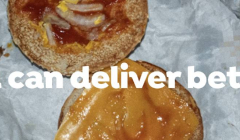
Knorr spotlights fast food fails to deliver better
The campaign from MullenLowe highlights that home made food can be better than takeaways.

Dupes might be infuriating but leaning into copycats can help to build brand.

With nearly 6bn views on TikTok, #dupe culture is having a moment. Not surprising given the economic climate, as 11% of UK consumers admit to buying faux products once every few months. In fact, dupe discovery has become social currency for Gen Zs flaunting phoney foundations and pretend Prada. Such is the ubiquity of conversation around clever copycats, brands like Lululemon are leaning into the phenomenon, encouraging consumers to swap their spurious sportswear for the real thing. A gamble which paid off, given that 50% of those attending Lululemon’s inaugural ‘dupe swap’ were new customers.
But battling the bogus is nothing new within food and drink. Brand sabotage from the rise of European discounters like Aldi and Lidl, and cheaper supermarket own labels has meant FMCGs have long had to justify their price point.
When seen as a consumer stamp of approval, dupes can increase desire for the real thing. Remember what your brand stands for and don’t be afraid to lean into those values, helping audiences distinguish authentic from fake.
Daisy Pack, Managing Director, HUNTER: UK
As copycats become cool, here are four lessons to learn from food and drink brands which have successfully built and safeguarded their authenticity and image:
Freshen up your cultural relevance and be more ‘Lululemon’ – in other words, don’t be afraid to engage. Hunter launched the Tabasco Brand on TikTok, having spotted a consumer documenting her challenge on the channel to refill a mini-tabasco bottle, with (gasp!) competitor sauce. Combining product seeding, community management, experiential, PR, and a willingness to take a risk, the brand purposefully fanned the flames of the #hotsaucewars, to create a social moment this consumer – and the world watching – wouldn’t forget. The strategy paid off with Tabasco becoming the most followed hot sauce globally on TikTok, within a month of launching.
When seen as a consumer stamp of approval, dupes can increase desire for the real thing. Remember what your brand stands for and don’t be afraid to lean into those values, helping audiences distinguish authentic from fake.
When faced with the launch of copycat challenger, ‘Heritage Breeds’, a colourful egg brand, Clarence Court drove awareness and understanding of its premium positioning and genuine heritage to underpin its higher price point. Celebrating 90 years since the brand’s origins, Clarence Court created a ‘look-book’ with exclusive imagery and recipes from top chefs and aligned with premium partners to host multiple media and influencer events, delivering product quality, provenance and welfare messaging during its anniversary year. Widespread visibility helped drive up sales for Clarence Court, maintaining its market top spot in the face of challenger competition.
Brands which remember customer loyalty comes from this level of trust in product quality and production standards will do well. Last Christmas the FSA warned consumers against fake chocolate bars branded ‘Prime’ and ‘Wonka Bars’ which could be unsafe to eat. Meanwhile, in an innovative bid to fight the phonies, Italian brand Parmigiano-Reggiano embedded edible microchips in its cheese helping consumers identify ‘formaggio forgeries’.
No doubt imitation is more infuriating than flattering, but don’t be swift to sue. The cautionary tale of M&S and Aldi’s rival caterpillar cakes Colin versus Cuthbert may have kept us entertained, but the case belies the challenges of launching copycat action. While M&S successfully defended its light-up festive gin bottle design from a discounter version, Thatchers Cider recently lost its trademark infringement claim against supermarket Aldi. While the odds may seem stacked in your favour, the resulting story could be very different. Consider concentrating on making a mark in culture for positive reasons, earning the attention of those who matter versus prosecution professionals.
As the popularity of K-wave culture expands to the kitchen, kimchi brands without Korean connections have emerged. Jongga, Korea’s No. 1 Kimchi brand, reinforced its authenticity to UK audiences through an engaging experience with wide news appeal. The Jongga Flavourverse was a three-week pop-up, inspired by multiverse themed pop culture. Creating a culinary journey across immersive worlds, we enabled visitors to travel with their tastebuds, when the cost-of-living crisis had them grounded. Importantly, we showed how the brand delivered deeper value to consumers beyond the product. Powered by PR, including on-trend chef partnerships, influencer marketing and earned media outreach, we brought a slice of Seoul to London, no passports required, reaching over 244 million and driving a 27% consideration uplift, placing Jongga firmly on London’s foodie map, in the face of less authentic competition.
The rise of cheaper mimics shows the importance of building brand love amongst consumer audiences. Today’s shoppers have a sophisticated consideration set. They don’t want to buy stuff for the sake of it. They are interested in a brand’s backstory and how it contributes to society. To engage with young consumers looking for value, brands shouldn’t change the conversation but become part of it. Brands which forge an emotional tie by showing up in culture with distinction are best protected from copycats.
Driving positive transformation through a combination of empathy and commercial intelligence, Managing Director of HUNTER: UK, Daisy Pack has represented some of the world’s most famous food and drink brands over a career spanning more than two decades. Expert in insight-led, creative campaigns which earn attention, Daisy has delivered award winning work for a combination of mainstream, premium and luxury brands.
Looks like you need to create a Creativebrief account to perform this action.
Create account Sign inLooks like you need to create a Creativebrief account to perform this action.
Create account Sign in